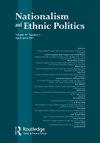An Identity in Quests for Self-Determination: The Case of Indigenous People of Biafra Separatist Movement in Nigeria
IF 1.1
Q3 ETHNIC STUDIES
引用次数: 0
Abstract
Abstract Since the lull of nationalist struggles and after many merged ethnic-nationalities attained statehood, separatist movements with distinctive identities have increased their agitations for self-determination. The deficit or decline of national cohesion in Nigeria and other independent states has been ascribed to the proliferation and radicalization of separatist movements. Therefore, to provide effective political measures, it has become necessary to quell separatist movement agitations and foster substantial national cohesion. This article examines the actions of the Indigenous People of Biafra (IPOB) separatist movement in South East Nigeria and altruistic political solutions to its quest for self-determination. It explores the IPOB’s grievances, strategies, and approaches and the factors sustaining its struggles and uses both primary and secondary sources of data. The study shows that after years of the Nigerian–Biafran war, the Igbo of the South East are still gripped by political alienation, which has led to a renewed call for Biafran statehood. It thus recommends that, rather than using a securitization and militaristic approach to diminish the group’s claims for self-determination, the Nigerian government should initiate a dialogue and ensure ideal inclusive governance to achieve equitable representation of the South East at the national level.追求自决的身份认同:尼日利亚比夫拉分离主义运动中土著人民的案例
民族主义斗争沉寂以来,许多合并的少数民族获得国家地位后,具有鲜明身份的分离主义运动加强了对民族自决的鼓动。尼日利亚和其他独立国家的民族凝聚力不足或下降被归咎于分裂主义运动的扩散和激进化。因此,为了提供有效的政治措施,必须平息分离主义运动的煽动和促进实质性的民族凝聚力。本文检视奈及利亚东南部比夫拉原住民(IPOB)分离主义运动的行动,以及寻求自决的无私政治解决方案。它探讨了IPOB的不满、策略和方法以及维持其斗争的因素,并使用了主要和次要数据来源。研究表明,经过多年的尼日利亚-比夫拉战争,东南部的伊博人仍然被政治疏远所困扰,这导致了对比夫拉国家地位的重新呼吁。因此,它建议,尼日利亚政府不应该使用证券化和军国主义的方法来削弱该集团对自决的要求,而应该发起对话,确保理想的包容性治理,以实现东南地区在国家一级的公平代表权。
本文章由计算机程序翻译,如有差异,请以英文原文为准。
求助全文
约1分钟内获得全文
求助全文
来源期刊

Nationalism and Ethnic Politics
ETHNIC STUDIES-
CiteScore
1.30
自引率
0.00%
发文量
30
期刊介绍:
Nationalism & Ethnic Politics explores the varied political aspects of nationalism and ethnicity in order to develop more constructive inter-group relations. The journal publishes case studies and comparative and theoretical analyses. It deals with pluralism, ethno-nationalism, irredentism, separatism, and related phenomena, and examines processes and theories of ethnic identity formation, mobilization, conflict and accommodation in the context of political development and "nation-building". The journal compares and contrasts state and community claims, and deal with such factors as citizenship, race, religion, economic development, immigration, language, and the international environment.
 求助内容:
求助内容: 应助结果提醒方式:
应助结果提醒方式:


